*
Book Review Editor/Alan Britt
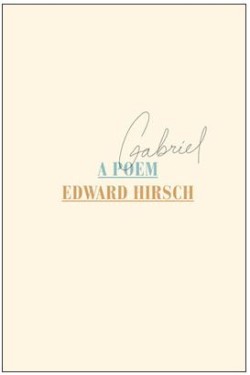
Gabriel: A Poem
by Edward Hirsch
Knopf, 2014
http://knopfdoubleday.com/genre/poetry/
(Longlisted for the National Book Award)
Hardcover: 96 pages
ISBN # 978-0385353571
Gabriel: A Poem
Reviewed by Carol Quinn
Gabriel is Edward Hirsch’s ninth published collection of poetry and a book-length elegy for the poet’s only child. The grief that gave rise to this work might be enough to silence any poet. But Hirsch finds that the only way through the torpor of grief is to raise his voice. In doing so, he manages to help his audience bear their own silent and unimaginable losses.
This book tells the story of Gabriel Hirsch’s adoption, troubled life, and sudden death at the age of 22. As Hurricane Irene was passing over Manhattan in 2011, Gabriel went out to a party that he heard about on Craig’s List, ingested a club drug, and suffered a cardiac arrest. This book also tells the story of his father’s grief, opening as his father gazes in disbelief on his dead son’s face. Edward Hirsch moves through his memories of his son as if trying to gather everything lest any memory be lost. We learn that, for his father, Gabriel was beautiful and full of unrealized potential. Gabriel’s psychological problems, however, began to emerge at an early age:
He came home from preschool
And opened the refrigerator
Where’s my fucking milk (14)
Gabriel struggled with Tourette syndrome and a pervasive developmental disorder as he was sent from school to school, and as treatments and psychological professionals often failed him.
As a young man, Gabriel was spontaneous and good-intentioned—and quickly found friends when he moved with his parents to New York City—but remained oblivious to societal expectations and codes of conduct:
He brought a six-pack of beer
Into the common room of the nursing home
To watch a football game with my mother
Because everyone needs a good beer
Especially the guy on the ventilator
And the nurses who work too hard (37)
Because of the behavioral problems that manifested in his son’s life, the poet comes to associate his son with a type of destruction. At the same time, however, the father admits,
Some nights I could not tell
If he was the wrecking ball
Or the building it crashed into (43)
Occasionally, Gabriel is also represented in terms of a storm that has come on land, even as he eventually went out into such a hurricane and was lost.
In search of consolation, Edward Hirsch looks to the works and lives of other poets and artists—Ben Jonson, Izumi Shikibu, and Stéphane Mallarmé among them—who lost children. At the heart of this book is the discovery that the loss of Gabriel is the loss of the poet’s greatest work, even as
Jonson wrote a poem and called his son
His best piece of poetrie
A lovely line a little loathsome
I loved that poem once
He said we are lent our sons never take
Too much pleasure in what you love (8)
A current of difficult introspection emerges. Hirsch does not find solace in the accounts of the suffering of other poets and artists who lost children; rather, his vast literary knowledge leads him towards regret:
It is a true error to marry with poets
John Berryman concluded
Or to be by them (20)
Gabriel, in fact, is riddled with regret—over what was and wasn’t done during the son’s life, or over the time the father spent writing and working on professional pursuits—even as the son was growing up and profoundly troubled, and Hirsch admits,
We never heard a nightingale
Or played cricket on the beach
Or sang karaoke together
Maybe we should have kept him home
From boarding school Janet and I
Never quit arguing about it (34)
“Maybe we should have kept him home” reprises an unanswerable question hinted at throughout the text: Why did Gabriel have to go out on the night of the storm?
Formally, this book consists entirely of three-line stanzas, each suggesting a beginning, middle, and end—or rudimentary narrative arc. These stanzas also sometimes carry the distant echo of Dante’s Inferno (as well as the retribution and regrets of more contemporary dantescas):
Something about amputating your arm
Because it bothered you
It was never a wing anyway
Something about amputating your leg
Because it hurts
You will never walk away from this (54)
At other times, these stanzas contain an impulse akin to haiku, as in one of the starkest fulgurations in this book-length elegy:
It is time
To turn off the lamp
And come down from your study (25)
There is also a limitlessness in these unpunctuated stanzas. Each page, which serves as a section of the long poem, has no title. Beginnings and endings fall away. In this boundlessness, there is a longing to circumvent the inevitable ending of Gabriel’s story—even to shatter barriers between worlds. There is also the suggestion that the father’s mourning may have no end. The three-line stanzas of Gabriel are consistent with the overarching narrative of the father’s new grief and cognitive dissonance at seeing his dead son’s face: the thesis, antithesis, and synthesis of being confronted with the son’s death, turning away in disbelief, and finally accepting what has happened. Ultimately, however, the book rejects the possibility of closure—even though the poet has continually sought consolation—as the father realizes that nothing can bring back his lost son.
The language of Gabriel is deceptively plain; the lost son, it seems, would have scoffed at pretention. Yet at times the voice of this poem almost harmonizes with the book of Lamentations; by the end of this collection, even God is called to account:
I hope there is a God
Shahid said after his mother died
He owes me an apology
Melville does believe in God
Lawrence Thompson told his class
He thinks He’s a real son of a bitch
I solemnly swear before God
That a real Son of a Bitch
Who does not exist
Owes me an apology
Which I will not accept
Anyway I thought the Lord
Cannot help me now or ever… (76)
Belief in God or an afterlife—two of the traditional consolations of elegies of earlier times—are rejected at this point, as they cannot bring back the lost son.
The poet returns to the scene of the funeral, where, according to Jewish tradition, immoderate grief is discouraged. In The Dominion of the Dead, Robert Pogue Harrison asserts that the ritualization of mourning as a way to discourage the potentially self-destructive behavior of grief is very old, and that evidence of such motives for this ritualization can be found throughout the records of the ancient world. (Harrison 57)
Even so, the poet wails loudly over the casket of his son. Hirsch writes,
I don’t want to hear anyone
Scolding me from her wheelchair
Because I’m crying too hard
I’m not worried about a heart attack
Nothingness
You’ve already broken my heart (77)
Like the father’s cri de coeur, Gabriel is not a safe and codified response to bereavement, but a refusal to accept the constraints and rituals of mourning. Similarly, this book defies contemporary societal pressures to remain silent in grief or to hide all signs of it. Out of his recognition of the difference between ritualized mourning and grief’s necessary course, Edward Hirsch writes,
I did not know the work of mourning
Is like carrying a bag of cement
Up a mountain at night
The mountaintop is not in sight
Because there is no mountaintop
Poor Sisyphus grief (73)
In their elusive promises of closure, perhaps even some contemporary psychological responses to bereavement share similar motives with those ancient prohibitions. Hirsch’s elegy for his son challenges the idea that there are appropriate circumstances or periods of time for mourning, and illustrates how poetry is capable of illuminating the shadows of theory. Hirsch also comes to recognize his own suffering in others:
Look closely and you will see
Almost everyone carrying bags
Of cement on their shoulders
That’s why it takes courage
To get out of bed in the morning
And climb into the day (73)
For Edward Hirsch, an elegy that rejects easy consolation and honors the wildness of grief becomes the only way for bereavement to run its course. Such a poem is also a fitting way to honor his son’s own defiant character. And we share Hirsch’s grief with him, even as he helps us to bear our own.
Works Cited
Harrison, Robert Pogue. The Dominion of the Dead. Chicago: U of Chicago P, 2003.
Hirsch, Edward. Gabriel: A Poem. New York: Knopf, 2014.
About the reviewer:
Carol Quinn’s poetry has appeared in 32 Poems, Western Humanities Review, The Cincinnati Review, Pleiades, Colorado Review, and other journals, as well as the Women Write Resistance and Hot Sonnets anthologies. Acetylene, Quinn’s first book of poems, was selected by Dorothy Barresi for the 2008 Cider Press Review Book Award and published in 2010. Her reviews and scholarship have appeared in Pleiades, The Emily Dickinson Journal, The American Book Review, and Voltage. Dr. Quinn has also recently won the So to Speak: A Journal of Feminist Language and Art Poetry Prize.
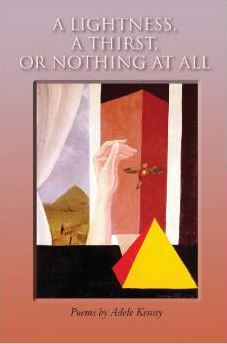
Price: $11.84/Amazon
Hardcover: 80 pages
Publisher: Welcome Rain Publishers (April 7, 2015)
Language: English
ISBN-10: 156649396X
ISBN-13: 978-1566493963
*
“A Lightness, A Thirst, or Nothing at All,”
by Adele Kenny
Review by Emily Vogel
Adele Kenny’s poetry has always struck me as being intensely focused and meticulously crafted. The elegance of her craft never fails to surprise me – with its meditative edge and integrity in its spiritual aspects, without being pretentious, and never overwrought in its devotional elements. She is by far on my list of favorite poets that is actively crafting her language today.
I was delighted to receive her new book of poetry, “A Lightness, A Thirst, or Nothing at All” in the mail – I read it from cover to cover, something that I suspect few poets and readers even attempt to do these days (rather they would read a few select poems and then set it on the bookshelf, or even let it get lost under the front seat of their Honda). The poems in this book bear a particular sacredness, immersed in the details of nature and the interconnectedness that her observations have of the natural world with an almost otherworldly dimension. She accomplishes this by way of careful phrasing, and her signature parentheticals, which seem to speak the inner life even inside of the inner life, as though the “self” possessed multiple layers of complex sentiments.
In “Despite her Attachment” she writes, “She pushes back the rules of engagement – battles, dramas. Clarity happens – sometimes by accident, sometimes by invitation.” She is a poet in constant search of “clarity” – and more often than not, finds it. In many of the poems in this book, she writes as if in the third person, as if seeing herself as a character from a close distance. I see this as a way of knowing the self for all its desires and longings, except not from the intimate confession of the “I.” With that in mind, her first person poems in this book do not vary greatly from the third-person gestures.
Sometimes the poet sees herself reflected in aspects of the other, as in “How She Grieved”: “What I can tell you about the woman with aqua hat, the woman with six birds, a parrot on her shoulder – the wall she cut through to build a room for the birds, and how years later, they died” – and then in the last line of the poem: “If you listen, you will hear her call them back, their absence and presence the same.” Here, I’m delighted that she takes the binary of absence/presence and conflates it – a sharp observation, as often absence and presence seem so closely intertwined. With this tactic, she effortlessly establishes what is sometimes the essence of where grieving occurs. There is also something about this poem which allows the self an inner life that is quietly and humbly enduring – by way of the woman with the birds as both vehicular and dream-like.
These poems attest to the small joys that arise from an enduring grief, which transform into something akin to a tranquil sea and an absolute attention to the world’s presence, and the presence of the self amid the world. She creates a world where the birth of words can happen through a very humble and quiet place, and which come as small blessings. Her words are to the poems as morsels of bread are luxuries to the hungry birds. The reader could get the sense that these poems are not only journeys of the self, but also manifestations of where we might find the world as a holy realm.
I would enthusiastically recommend reading this book of poems, if not only for a close look at how to endure the natural and sometimes unlikely ebbs and flows of our existences, but for the salvation of language through struggle and grief, that it might also make you want to sit and look out of your window, no matter what season, and know that life subsists and world elucidates its own random beauty – whatever the circumstance. Her poems in this book speak from a humble prophetic pen – and she does not ask for anything, except to listen, observe the transience of the world and all the discovered joy of its transcendence.
About the reviewer:
Emily Vogel is the poetry editor of Ragazine.CC. You can read more about her in About Us.

Michael Goldberg
True Love Scars
Neumu Press, © 2014
www.neumu.net
ISBN: 9780990398301
True Love Scars
Review by M. Sedlof
OK, so I’m reading this book, “True Love Scars”, which is taking me fuck forever so long to get through because I’m up to my ass in work and trying to just read it so I can write a review and Goldberg is sending emails asking what do I think, have I read it, yet, is the review going to be ready when the book is launched, and did you see the review in Rolling Stone they loved it, and I’m just getting started, just getting in the mood to read the darned thing and don’t much care at this point what Rolling Stone said (I’d rather NOT know), though I’m glad they liked it, that piques my interest a bit in making sure I finish it, though I know from the get-go I’m going to finish it anyway, because crap, of all things, I was there, then, sort of, at least I think I was. For a few years, anyway, but before the scene he’s writing about really ever takes place, so I can look at it as some kind of rejoinder, a reunion with the old days without having to see anyone face to face, which is kind of crazy in itself because the music Goldberg so eloquently and fluently uses throughout the book to nail down date place time of one event after another is what they’re playing now on oldies and university stations, and I can see those faces clearly. As they were then, of course.
And yes, of course, I can relate.
Goldberg’s virginal sex scenes unwind at the same racing-heart-awkward-self-conscious-anxious pace one can almost remember from those good old, bad old days when the forbidden fruit was all one ever wanted then-and-forever-after, only how to get it without letting it slip through your hands like sand, when all you ever did was what it took to make like you cared, when all you knew about caring was what you heard at home, an attitude you didn’t know you didn’t have that cost you big time.
There’s more music in this story from the ‘70s than I have on my ipod, but at least I have some of it; with that in mind, you’ll like what our hero Michael Stein, aka Writer Man, brings to life from the lines of Bob Dylan, all those Visions, and much more. So the more I read the more I realize, “Of course Rolling Stone liked it. What’s not to like?” This was life in California during the denoument days-months-years of Summer of Love, Altamont, the winding up-down of Vietnam, of Roman Polanski and Charlie Manson, Sharon Tate … of Haight and Half Moon Bay, of kids who didn’t surf, who confused and burned-out ended up discovering what the core of life is really like, deep inside, where if you’re lucky enough to find yourself before you die you might even claw your way out, (Reminder of “Been Down So Long It Looked Like Up To Me”). It’s one kid’s story, and then some.
Of note: A must-read for high school and college kids who are dealing with all kinds of unknowns; a touchstone for the middle-aged who think they’ve got it down; a bit of lore for elder tribe survivors who remember, “everybody must get stoned.”
I’m looking forward to the next two books in this trilogy to see what more is revealed about Lord Jim, Stein’s way, and the other characters Goldberg conjures with his mental, physical and metaphysical journeys back and forth in time.
About the reviewer:
- Sedlov teaches palmistry from a small studio on East 8th Street in New York City. You won’t find him on facebook.
*
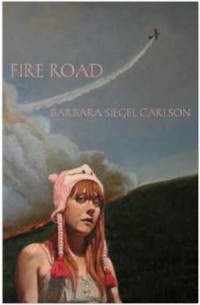
Fire Road
by Barbara Siegel Carlson
Dream Horse Press
Aptos California, 2013
http://home.comcast.net/~jpdancingbear/dhp.html
ISBN 978-1-935716-24-2
Fire Road
Review by Miriam O’Neal
“You can hear the mourning dove call / from a distance. It says what I cannot/ understand.” So begins the first poem of Barbara Siegel Carlson’s, Fire Road. A speaker addresses you about the unknowable, about the way that knowing does not use words, but it speaks to us just the same. This is the first language of the poems of Fire Road. What is imagined, what vanishes, what remains after the vanishing. Carlson evokes a sense of duality. She understands that we locate ourselves in our own minds while the world outside insists on a different version of the story. These poems strive to resolve those differences as they travel back and forth between the mythical and the mundane. It is a book full of journeys, but also full of standing still.
Sometimes, in these poems, we hear a thought or question, but other times we feel or smell or see the moment as Carlson employs all of the senses to get through the doorway to the mystery. The tiny, permanent ink dot on her mother’s arm fascinates the child in “Blue Stain,” but it also reminds us of that other ink on forearms of ancestors. From “Blue Stain” we learn that “When the El roars over everyone vibrates./ In very wake chimes shudder…” The shorter lyric poems scattered through the book, work that way for this collection. They make open spaces that are charged with the vibration of the longer poems.
Artists, musicians, and philosophers make appearances in Fire Road; Spinoza, Schubert, Giotto, Father Charlie, and others. Sometimes they seem as necessary as “the shrill resonance of crickets/ whose wings ignite dream…” in “Waking Alone”. Where they work best is where they act, as in “The Truth,” which begins “Spinoza is rubbing my glasses again, leaving/ the middle range blurred for a reason.” or when they make sound sense, as in “Personal” where Janus appears. Written after C.D. Wright, “Personal” reports and intimates at the same time: “…Favorite words: w(hole), ravel, ravish,/ and universe. For everyone’s a Janus.”
Though I couldn’t remember that god’s story, I bought the claim because of the line’s sound. Later, I looked up his story and loved the line anew. Janus is the god of change and these poems help us remember that we are always crossing thresholds, turning corners, navigating to or from the present, fording the stream of resonance dredged deep by sounds and smells; that dreams are embedded with hidden rocks; that morning damns the flow or parts the waters for safe crossing back to the now.
“Personal” rings with the necessity of naming one’s self. Consider the conceit of self identity based on possessions as mundane as “my first place ribbon for the rope/ climbing contest…” in the same poem that begins with “Some mornings my hair looks like sea smoke.” The nostalgic and the ethereal keep company in the mind of the speaker, as if the self’s collection of recognized achievements paired with self-perception can name the whole. And while there is a lot of self-reflection in the collection there are also others; strangers on the street, immigrants harvesting the bogs; men and women who become doors or mirrors.
The women of these poems are not thinkers or artists in the common sense. They are gypsies and mothers and unnamed speakers or characters, with the exception of Hagar, who, though she is the subject of her own story, was also a handmaiden and a mother, and Hermione, who was made famous by virtue of her birth to Helen of Troy. Their stories are recast so that we think of them more as amazing survivors than as victims of their fates.
As the collection of characters mentioned places the poems intellectually and inspiration-wise, the places of the poems in Fire road underscore the layered influence and stories of place. Butcher’s Bridge, Lidece, a Czech village destroyed by the Nazis in 1942, The Iowa River, etc. In “Tiergarten,” Carlson moves us from the original life of the place as home to the Kaiser, to its use as “the villa where the organization to/ ‘annihilate worthless life’ began…” The image of the patients of the asylums being led out to their deaths haunts the closing lines of the poem as we are returned to the present where
A man in a white suit looks up at a tree of falling dew.
Everything is lush, hushed, the sprinklers come on
and water the empty walks. One of the branches shakes.
Moving from “Tiergarten” to “Death Song”, a more personal haunting evokes private space and private grief, still, the reader has a place to land, a window to see out of, a view. “…there’s a stump out my window, a vine/ hanging down, a frayed piece of rope/ where a swing once rocked that doesn’t stop.”
“Litter,” which follows these 2 poems, acts as a relief valve. As we encounter ordinary bits of trash on a morning walk, we come up for air and, even the little “…mouse-like creature” that …still shakes me a little now that it’s just a thing” seems manageable. In this poem, like the speaker of the list, we “move away” from the deeply shadowed spaces of the previous poems. We return, for a while, to ordinary time.
In some of these poems questions are the leitmotif of the verse. The single, well-placed question, as in “A Haunting Music,” or a relentless set of questions, as in “Hidden,” work best. In poems like these, the questions arrest the reader in a single moment on the one hand, or advance us in a kaleidoscopic way on the other.
In real world parlance, a fire road is designed for access to hard to reach parts of a forest in case of fire or some other disaster. Those roads are often gated to prevent casual use and few people travel them without a sense of urgent purpose. Those who do walk or drive them, often discover hidden, untouched spaces and vistas. Carlson’s Fire Road does that too.
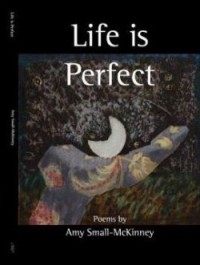
Life Is Perfect
by Amy Small-McKinney
Book Arts Press
www.book-arts-press.com
Jon Paster, Cover Design
88 pages, $12.50
ISBN # 0-9795861-4-3
Life Is Perfect
Review by Christina Francine
Life Is Perfect is a plunge into determined thoughts, a quiet walk of contemplation. Beautifully written and profoundly releasing; Amy Small-McKinney draws attention to dark crevices of reality, the ones often unspoken. Combine craft ability with subtle shades of family topics and reflection awakens. Reflection cannot be helped. Life Is Perfect reminds politely and projects peacefully, twining around powerful subjects. Small-McKinney provides a message too, an assurance that life is the way it’s supposed to be. It’s perfect.
Three chapters separate the book. One is titled “How It Is,” the second, “To Speak to You,” and the third, “Okay.” In addition are “Author’s Notes,” “Notes on the Poems,” and “About the Author.”
In her poem, “Life Is Perfect,” Small-McKinney reminds us life is the way it’s supposed to be even with all the situations, feelings, desires, disappointments, and changes. Life is hard and messy, yet okay. In this poem, Small-McKinney explains to her daughter “life is perfect/because it is imperfect.” At the end of the poem she adds, “All of this we had better just love. Even the thorny locust trees that we can barely/tug apart from the elegant hostas/because those trees push up and out/against our limey soil and drought hardened earth/in spite of our yearnings/in spite of who we become.”
The theme of Small-McKinney’s book is though life seems ordinary, happiness if found from “the juicy orange,” “the sofa on sale,” and “not lost job.” Significance is found peaceful ordinary and from the predictable. “I know this world,” she states, “I wake, spy my slippers, my robe.”
One of the last poems reflects on lived life, on sweet and bitter moments. Small-McKinney takes comfort with the fact that she “cannot be alone in this,” and “The need to begin- again” because her child has grown.” Life is perfect in that, through the act of being on one’s knees “reaching for beneath a dresser,” some kind of aid is there. When she “was drowning” she felt “someone/a guardian spirit” held her and “in turn held those I {(she}) loved.” This author’s comfort is reader’s comfort. Her message is profound; we don’t have to be elegant all the time. We don’t have to get everything or be perfect in order for life to be perfect. Her recommendation, kneel into life.
Amy Small-McKinney has published two chapbooks of poetry, Body of Surrender (2004) and Clear Moon, Frost (2009), both from sixth Finishing Line Press. Her work has appeared in numerous journals, and her poem “Nighttime, Enigman, and Nostalgia,” was nominated by Switchback for the Sundress’ Publications Best of the Net 2012. McKinney was a nominee for the Pushcart Prize in both 2004 and 2006. She’s founder of Finding Our Voices: Poetry & Resilience and promotes poetry, particularly for those struggling with mental health. Amy Small-McKinney lives in Blue Bell, PA with her husband, and is mother to a college student.
About the reviewer:
Jon Paster created the cover design for Life Is Perfect. He has been involved in digital document production, including digital typography and imaging for over ten years, with books, booklets poetry chapbooks, websites, and a variety of other publications.
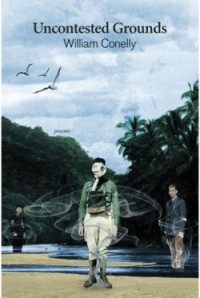
Uncontested Grounds
by William Conelly
Able Muse Press, March 2015
http://www.ablemusepress.com/william-conelly-uncontested-grounds-poems
90 pages, $17.95
ISBN #978-1-927409-39-8
Uncontested Grounds: Poems
Reviewed by Joe Grimwade
The opening of Uncontested Grounds describes a barren agricultural landscape, speckled with the “talcum dust” of the American plain: “Do not return me to the country,” the protagonist pleads; “Don’t fetch me out to margin lands…” Yet it is these “margin lands” which the collection continually revisits: the liminal regions where land meets sea; the obscure realms between dream and consciousness; the transient identities of the traveller; the uncertain boundaries which separate the boy from the man, and a man from his lover.
Conelly’s writing is at its most thought-provoking when it combines several of these subjects, as in A Seaside Triptych:
Hake turn and hover where
the sea floor slopes up riffled sand
to breach the faintly churning
boundary with air…
[…]
but seals, ovoid with planar limbs,
shan’t heave beyond one summer’s reach
of the boy who dreams – but rarely swims –
into the gray-green otherwhere,
down bubbles of subverted air.
Repeatedly, Conelly identifies vulnerability in transition. The Traveler is shocked to find that he has missed his plane while absorbed in a book, “for where he sat was an empty meadow, / silent except for the hum of bees / in an immense white noon.” Similarly, the “tart warm feel” of cologne in Memento ambushes the protagonist with the memory of a past lover, late at night, “when hurtful old compulsions gleam / like razors in [his] bathroom lights.”
The nebulous threat of Memento solidifies in Conelly’s war poems. Informed by a spell in the US armed forces, they lie scattered like land mines throughout the collection. The Lead Man, a fighter pilot in Vietnam, embodies the adrenal chaos of combat: “the bolt and hammer of collective will / that launched his jet with missiles and napalm / each day to interdict, engage and kill…” Subsequently, Remembering War presents us with the “wet husks” of men at the death of a battle.
Uncontested Grounds also contains several lighter works. False Summons is worth quoting in full:
Outside a woman calls my name
and though it’s night, and she’s a stranger,
I start up blinking just the same.
Her voice is laced with hurt or danger.
She skirts the darkened shrubs and lawn
still calling, I deduce, her cat.
I can lie back again and yawn.
No woman wants me quite like that.
As the strict tetrameter of False Summons illustrates, Conelly is, by and large, a formalist. By observing rhyme and meter, he often brings potentially unwieldy subject matter into order; occasionally, he forces the language beyond breaking point, as in A Sonnet after Chekov: “He marries Tanya, spirits her to town, / and soon’s found babbling to an empty chair.” While the kind commentator might suggest that the ungrammatical “soon’s” reflects the “babbling” of Chekov’s protagonist, this critic suspects it to be an oversight for the sake of metrical convention. As for the quality of the publication, Able Muse Press has done a poor job of reproducing the artworks that accompany five of the poems, so that they contribute little.
Nevertheless, Conelly’s debut is a substantial body of writing: his poetry inhabits the liminal, fleeting sphere, and for this reason, we should make time for it.
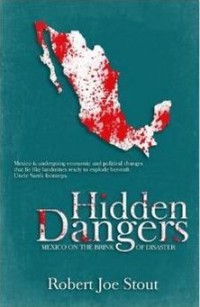
Hidden Dangers: Mexico on the Brink of Disaster
by Robert Joe Stout
Sunbury Press
50 West Main Street, Suite A
Mechanicsburg, PA 17055
ISBN 978-1-62006-488-7
210 pages, 6×9, paperback, full color ($16.95)
Hidden Dangers: Mexico on the Brink of Disaster
Reviewed by Jeff Hubbard
As a native Southern Californian I have been interested in Mexico and Central America my entire life. In the last 10 years I have made an effort to read and understand as much as I could about the Mexican Revolution and, to some extent, 19th century Mexican history. My wife is a Mexicana and hence, my extended family, are all from Mexico. I enjoy listening to their stories of the old country and what prompted their immigration to the United States.
This book, of recent Mexican events and history, is one of the most fascinating current events books I’ve read in a very long time. Issues of the real reasons for the development of the “drug cartels” and border problems are addressed in a clear and logical manner. The reasons for, and the true impact of, Mexican immigration are addressed in a compelling fashion. The book examines corruption in Mexico and how it fits, “hand in glove” with American interests- especially as it relates to the “War on Drugs”. I was troubled and captured by the relationship between the Mexican government and the Mexican media. It takes profound courage to break from that grasp and speak the truth as a journalist in Mexico.
I can’t emphasize enough how much I appreciated this fine work by Robert Joe Stout who actually lives in Mexico and has an extraordinary grasp on the history, culture, and current socio-political milieu of the country. If, like me, you have a hunger for deeper understanding of the real issues in contemporary Mexico you must read this excellent book.

Recent Comments